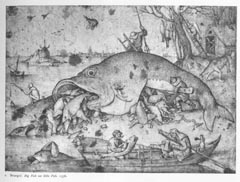
Brueghel "Peixe
grande come peixe pequeno" 1556
The task of critical theory,
according to Horkheimer, is to penetrate the
world of things to show the underlying
relations between persons.
For Horkheimer, critical theory
proceeds from the theorists´s awareness
of his own partiality.
Stanley
Aronowitz, Introduction, Horkheimer 1937
|
Crítica
The real social function of philosophy
lies in its criticism of what is prevalent.
Horkheimer
Crítica é a
posição e/ou
produção intelectual que procura
descobrir os processos que regem a
reprodução da sociedade capitalista,
expondo os antagonismos e a dialética que
produzem as transformações apesar
de todo o esforço da
reprodução social para a
manutenção do status quo
apoiado no Estado.
Focando as transformações
alcança a perspectiva histórica e
revela a transitoriedade da ordem estabelecida.
A crítica se contrapõe
à ideologia
que procura apresentar a formação
social burguesa --o status quo-- como
imutável e desejável (o melhor dos
mundos).
Por outro lado, a crítica se apoia
em uma utopia
que serve de referência para o potencial
de mudança, da alteração do
status quo.
Definir algum 'método
crítico' é tarefa elusiva, mas ele
certamente excluiria dogmatismo e até
ortodoxia. Horkheimer escreve em sua
Introdução à
reedição de seus ensaios:
Men of good will want to draw
conclusions for political action from the critical
theory. Yet there is no fixed method for doing
this; the only universal prescription is that one
must have insight into one's own responsability.
Thoughtless and dogmatic application of the
critical theory to practice in changed historical
circumstances can only accelerate the very process
which the theory aimed at denouncing.
Horkheimer
1968 Preface, Horkheimer (2002)
Referência
Horkheimer, Max (1937?) "Traditional and critical
theory" in Critical
theory/ Selected essays, Continuum, New
York, 2002
|